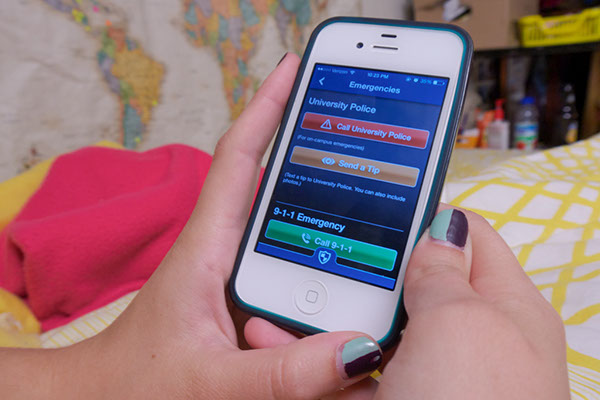

In order to increase campus safety and promote communication between students and university police, a new mobile safety app has been introduced this semester.
The Rave Guardian Campus Safety App allows iPhone and Android users to communicate with “guardians” and police – a capability that the NP Alert system lacks, said SUNY New Paltz Police Chief David Dugatkin.
The app, free for all SUNY New Paltz students, faculty, staff, as well as parents of students, has a few key components, including the ability to pick and use “guardians.”
The app user can pick guardians — a friend, roommate, parent, etc. and send them a request. You can also set university police as your guardian.
If a user is walking on campus or in town and does not feel safe, they can set a timer for the assumed amount of time it would take them to travel to their destination. The app then asks the user to choose a guardian. When the destination is reached, the app user puts in a pin to deactivate the timer and a message is sent to the chosen guardian that the destination was reached safely.
“But let’s say before you get to your destination you are attacked, have a medical emergency, or something occurred that makes it so you cannot turn off your timer,” Dugatkin said. “Whoever you picked as your guardian gets an alert.”
This alert, which prompts the guardian to send a text or call, is accompanied by a map using the phone’s GPS showing where the app user is located. If university police is set as the user’s guardian, the police will try to get in contact with you to confirm that you are safe. If that can not be accomplished, an officer will be sent out to find you using the GPS system.
Dugatkin, who has been looking to “incorporate technology into our ability to communicate with students, faculty and staff,” said the department looked at a few companies before they settled with Rave Mobile Safety.
“Surveys show that about 90 percent of [college students] have smart phones,” he said. “The blue lights are still out there, but everyone knows they’re not used as much as they used to be because everyone carries around a smart phone.”
Along with the “Panic Button,” an immediate contact to campus police with the GPS location and a personal profile information, the “Tip Texting” capability is another way the app “enhances safety on campus through a virtual safety network of friends, family, and campus safety,” according to the company’s website.
Students are able to report suspicious activity or people via text or pictures to campus police. An alarm will sound and the message will appear on a computer screen in the police department’s office, solely designated for communication with the app. Immediately an officer will respond with a text or call, asking for further information and how they can help.
Dugatkin spoke to first-year students and their parents at summer orientation about the new app and has been to every resident hall, teaching community development assistants and resident directors how to use the app in order for them to hold mandatory classes in each hall.
Although excited about the increased level of safety the app can potentially bring to campus, Dugatkin understands the apprehension some may have with the way the app works. In an age where “big brother is always watching,” he believes the tracking aspect of the app brings up a concern that has an answer.
“The only time the tracking is used, whether it be with a chosen guardian or university police, is when you establish that safety timer relationship only when the timer is running,” he said, adding that you can delete a guardian whenever you choose.
But students believe there could be other faults with the app.
App users running into a friend or forgetting to turn the timer of could cause family or police to be unnecessarily contacted, said third-year digital media production major Jackson Abatemarco. In addition, abusers of the app could alert the police over things that are not legitimate concerns.
Still, he said the app’s intention is positive.
“It sounds like a really great idea because I think women’s safety in a town like this, and just in general, is a really huge issue that constantly needs to be addressed and worked on – men’s safety too,” Abatemarco said. “You just want to make sure it’s being used properly. The law is nothing to [mess] around with.”
Dugatkin said he will continue to bring technology into the department in order to remain up-to-date with new technologies and further develop conversation between students and police.
“That’s something that I want to get out there – not that the police are your friend – but that the police are here, we work with you, we live with you, we’re here 24 hours a day,” he said. “If not for you guys, we wouldn’t be here. Our purpose is to protect, secure and educate.”
